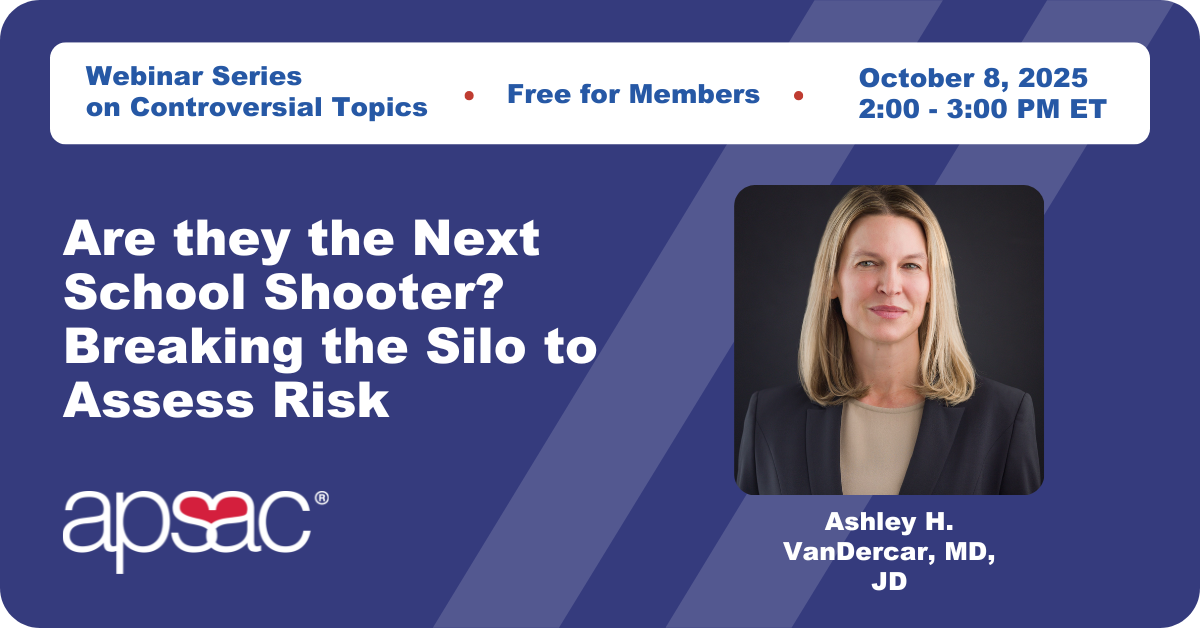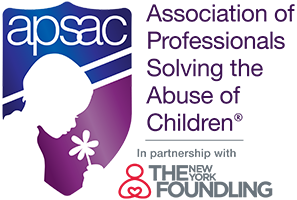| Date | Event |
| 10/8/2025 -10/8/2025 |  General Admission (individual session): $30.00 APSAC Members and The New York Foundling Staff Admission: Free 1 CE Credit (Social Work & Psychology) Non-Members: $30.00 1 CE Credit (Social Work & Psychology) APSAC Members and NY Foundling: $20.00 APSAC Members: You will receive your discount automatically when registering. The New York Foundling Staff: Please email FontanaCenter@nyfoundling.org to request your entry code. Target Audience and Content Level: Multidisciplinary professionals / Intermediate Interactive, Live Zoom We would love to see you! Please be prepared to have your camera on whenever possible. It helps create a more connected and engaging experience for everyone. If you need to turn it off, we trust you to take care of yourself. If you are requesting continuing education credit, being on camera is required for verification purposes. We appreciate your understanding and participation! Title: Are they the Next School Shooter? Breaking the Silo to Assess Risk Presenter: Ashley H. VanDercar, MD, JD Description: This webinar shows why multidisciplinary information sharing is crucial to averting school shootings. Although there is no profile of who will become a school shooter, there are relevant risk factors and behaviors that should prompt evaluation or intervention. Recognizing these patterns requires comprehensive data. Yet disciplines often silo information, making it challenging for any one professional to spot a developing threat. Through a forensic psychiatry lens, this webinar challenges participants to reconsider which information truly matters when assessing a student’s threat potential. Drawing on two decades of National Threat Assessment Center data, the session explains how seemingly minor details can shift risk. It also examines legal and practical reasons that keep stakeholders from sharing potentially critical information. Bio:Ashley H. VanDercar, MD, JD, is a board-certified forensic psychiatrist and licensed attorney. Dr. VanDercar has specialized expertise in violence risk assessments and post-arrest evaluations of criminal defendants. She has published and presented nationally on the intersection of mental health and violence, including psychiatric factors in lone actor terrorism, cult leaders, and school shooters. Her work emphasizes the value of behavioral observations and collateral data – both when making a psychiatric diagnosis and assessing violence risk. Learning Objectives:
Registration will remain open through the start of the Webinar Zoom Webinar System Requirements For the best experience, use a computer or mobile device with a stable internet connection. Please have the latest version of Zoom installed, along with working speakers and a microphone. A webcam is required if you're requesting continuing education credit. CE Course Completion Steps
Accessibility Accommodations: To request accessibility accommodations, please contact APSAC at onlinetraining@apsac.org. Provider Statements: Social Work: The American Professional Society on the Abuse of Children, Inc (APSAC), provider #1622, is approved as a provider for social work continuing education by the Association of Social Work Boards (ASWB ), www.aswb.org, through the Approved Continuing Education ( ACE ) program. APSAC maintains responsibility for the program. ASWB Approval Period: 7/27/22-7/27/25. Social workers should contact their regulatory board to determine course approval for continuing education credits. The Social worker participating in this conference received 1 continuing education clock hour.” Psychology: The American Professional Society on the Abuse of Children, Inc (APSAC) is approved by the American Psychological Association (APA) to sponsor continuing education for psychologists. The American Professional Society on the Abuse of Children maintains responsibility for this program and its contents. Cancellations and Refunds: No cancellations. No refunds. Registration is transferable. Requests for transfer to a future event will also be considered on a case-by-case basis. If you have any questions, please email us at onlinetraining@apsac.org. Questions and Concerns: Please contact the APSAC team at onlinetraining@apsac.org more info... |

Events available for Registration... Mental Health Section - 2025 1/7/2025 - 12/2/2025 register for this event... The APSAC Prevention Series 1/16/2025 - 12/18/2025 register for this event... Mental Health Section - 12/2025 12/2/2025 - 12/2/2025 register for this event... Do No Harm: Interviewing Skills Needed When There?s a Concern of Child Abuse: The Why, The When, and The How 1/5/2026 - 6/18/2026 register for this event... Zoom Chat: Improving Advocacy for Children Placed in Congregate Care Facilities 1/14/2026 - 1/14/2026 register for this event... 2026 APSAC Colloquium - New Orleans, LA 6/14/2026 - 6/18/2026 register for this event... Zoom Chat: Advocacy: Supporting Parents of Children with Disabilities? 10/8/2026 - 10/8/2026 register for this event... |
Events in the month of October 2025 | ||||||||||||||||||||||||||||||||||||||||||||||||



